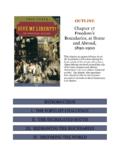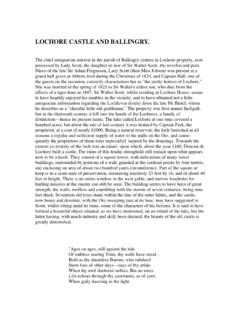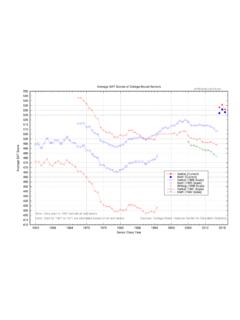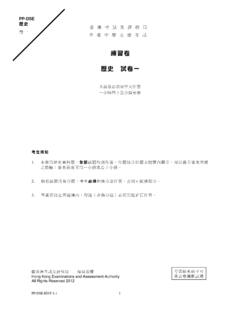Transcription of Chapter 15 “What is Freedom?”: Reconstruction, 1865-1877
1 OUTLINE Chapter 15 what is freedom ? : reconstruction , 1865 - 1877 This Chapter discusses the challenges faced by northerners and southerners after the Civil War. The federal government debated various policies for bringing the defeated Confederate states back into the Union. This Chapter also discusses what happened to the emancipated slaves as they sought their place as free people in American society. INTRODUCTION I. THE MEANING OF freedom II. THE MAKING OF RADICAL reconstruction III. RADICAL reconstruction IN THE SOUTH IV. THE OVERTHROW OF reconstruction INTRODUCTION STORY: Toward the end of the Civil War, Union General William T. Sherman met with a group of recently freed blacks in the southern city of Savannah.
2 The men were ministers, educators and leaders of the black community and Sherman wanted to know from them how freedmen thought about their new-found status and what might be done to help them succeed in a society that had once relegated them to slavery. The black leaders were clear that freedom meant the ability to prosper from one s own labor and what they needed was access to land. THEMES: 1. freedom produced important changes in black family life, religious practices, and education. 2. At the conclusion of the Civil War, the federal government debated different approaches to two issues: readmitting the former Confederate states to the Union and providing opportunities for former slaves to live as free people in southern society.
3 3. reconstruction succeeded in bringing the southern states back into the Union. 4. Despite some initial successes in providing economic and political rights to the freedmen, reconstruction ultimately failed because of white southern opposition and northern inability to support it. I. THE MEANING OF freedom FOCUS QUESTION: what visions of freedom did the former slaves and slaveholders pursue in the postwar South? A. Blacks and the Meaning of freedom 1. African-Americans understanding of freedom was shaped by their experience as slaves and observation of the free society around them 2. Blacks relished the opportunity to demonstrate their liberation from the regulations, significant and trivial, associated with slavery B.
4 Family, Church, and School 1. The family was central to the post-Emancipation black community 2. freedom subtly altered relationships within the family a. Black women withdrew to their private sphere 3. The rise of the independent black church, with Methodists and Baptists commanding the largest followings, redrew the religious map of the South a. Black ministers came to play a major role in politics 4. Blacks of all ages flocked to the schools established by northern missionary STUDY HINT You should be able to identify how black family life, religion, and education were changed by freedom . C. Political freedom 1. The right to vote inevitably became central to the former slaves desire for empowerment and equality a.
5 Being denied suffrage meant the stigma of inferiority 2. To demonstrate their patriotism, blacks throughout the South organized July 4th celebrations D. Land, Labor, and freedom 1. Former slaves ideas of freedom were directly related to land ownership a. Many former slaves insisted that through their unpaid labor, they had acquired a right to the land E. Masters without Slaves 1. The South s defeat was complete and demoralizing a. Planter families faced profound changes 2. Most planters defined black freedom in the narrowest manner a. freedom was defined as a privilege, not a right F. The Free Labor Vision 1. The victorious Republican North tired to implement its own vision of freedom a.
6 Free labor 2. The Freedmen s Bureau was to establish a working free-labor system G. The Freedman s Bureau 1. The task of the Bureau was daunting 2. The Bureau s achievements in some areas, notably education and health care, were striking H. Land and Labor 1. Blacks wanted land of their own, not jobs on plantations 2. President Andrew Johnson ordered nearly all land in federal hands returned to its former owners 3. Because no land distribution took place, the vast majority of rural freed people remained poor and without property during reconstruction I. Toward a New South 1. Sharecropping came to dominate the cotton South and much of the tobacco belt 2. Sharecropping initially arose as a compromise between blacks desire for land and planters for labor discipline J.
7 The White Farmer 1. Aftermath of the war hurt small white ID & S Freedman s Bureau ID & S Sharecropping farmers a. Crop lien 2. Both black and white farmers found themselves caught in the sharecropping and crop lien systems a. Every census from 1880 to 1940 counted more white than black sharecroppers K. The Urban South 1. Southern cities experienced remarkable growth after the Civil War a. Rise of a new middle class II. THE MAKING OF RADICAL reconstruction FOCUS QUESTION: what were the sources and the significance of radical reconstruction ? A. Wartime reconstruction 1. reconstruction began during the war as the Union devised means to govern defeated Confederate areas a.
8 Lincoln s Ten-percent Plan B. Andrew Johnson 1. Johnson identified himself as the champion of the honest yeomen and a foe of large planters 2. Johnson lacked Lincoln s political skills and keen sense of public opinion 3. Johnson believed that African-Americans had no role to play in reconstruction C. The Failure of Presidential reconstruction 1. Johnson s plan for reconstruction offered pardons to the white southern elite 2. Johnson s plan allowed the new state governments a free hand in managing local affairs ID & S Lincoln s Ten-percent Plan STUDY HINT You should be able to compare and contrast Presidential reconstruction with Radical reconstruction . D. The Black Codes 1.
9 Southern governments began passing new laws that restricted the freedom of blacks 2. These new laws violated free-labor principles and called forth a vigorous response from the Republican North E. The Radical Republicans 1. Radical Republicans called for the dissolution of Johnson s state governments and new ones established without rebels in power that gave blacks the right to vote 2. The Radicals fully embraced the expanded powers of the federal government born of the Civil War a. Charles Summer b. Thaddeus Stevens 3. Thaddeus Stevens s most cherished aim was to confiscate the land of disloyal planters and divide it among former slaves and northern migrants to the South a.
10 His plan was too radical F. The Origins of Civil Rights 1. Most Republicans were moderates, not radicals 2. Senator Lyman Trumbull of Illinois proposed two bills to modify Johnson s policy a. Extend the life of the Freedmen s Bureau b. Civil Rights Bill 3. Johnson vetoed both bills 4. Congress passed the Civil Rights Bill over his veto G. The Fourteenth Amendment 1. It placed in the Constitution the principle of citizenship for all persons born in the United States, and empowered the federal government to protect the rights of all Americans a. It did not provide for black suffrage 2. The Fourteenth Amendment produced an intense division between the parties H. The reconstruction Act 1.










